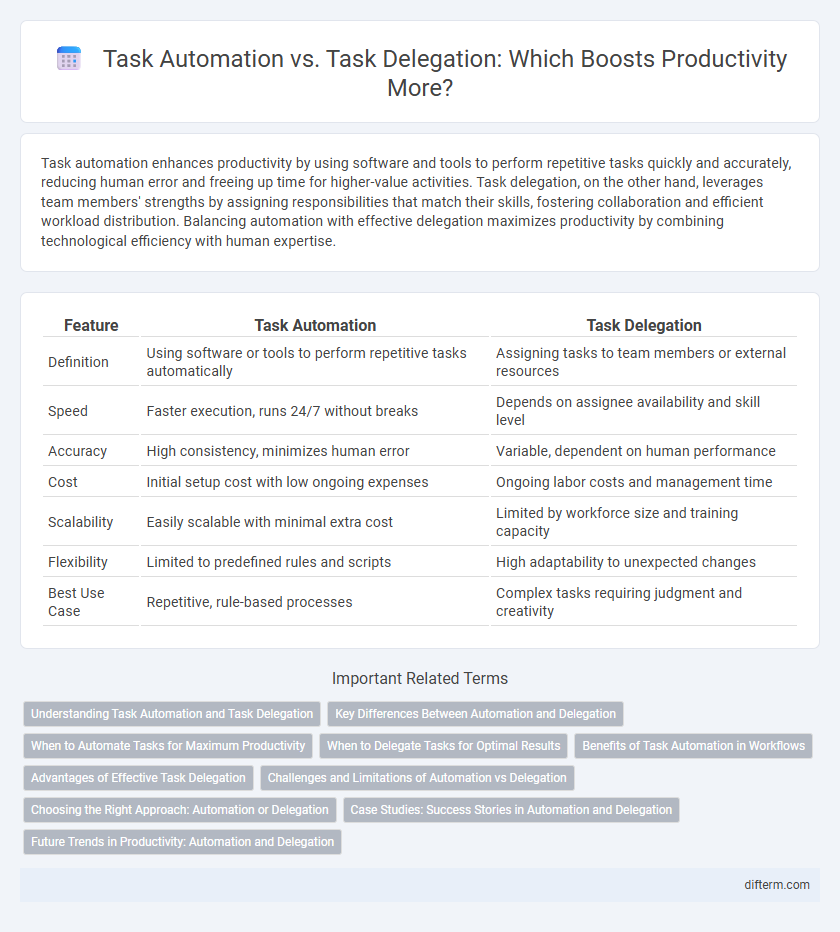Task automation enhances productivity by using software and tools to perform repetitive tasks quickly and accurately, reducing human error and freeing up time for higher-value activities. Task delegation, on the other hand, leverages team members' strengths by assigning responsibilities that match their skills, fostering collaboration and efficient workload distribution. Balancing automation with effective delegation maximizes productivity by combining technological efficiency with human expertise.
Table of Comparison
| Feature | Task Automation | Task Delegation |
|---|---|---|
| Definition | Using software or tools to perform repetitive tasks automatically | Assigning tasks to team members or external resources |
| Speed | Faster execution, runs 24/7 without breaks | Depends on assignee availability and skill level |
| Accuracy | High consistency, minimizes human error | Variable, dependent on human performance |
| Cost | Initial setup cost with low ongoing expenses | Ongoing labor costs and management time |
| Scalability | Easily scalable with minimal extra cost | Limited by workforce size and training capacity |
| Flexibility | Limited to predefined rules and scripts | High adaptability to unexpected changes |
| Best Use Case | Repetitive, rule-based processes | Complex tasks requiring judgment and creativity |
Understanding Task Automation and Task Delegation
Task automation leverages technology to perform repetitive or rule-based activities, increasing efficiency and reducing human error, especially in data entry, scheduling, and report generation. Task delegation involves assigning responsibilities to team members based on their skills and workloads, enhancing collaboration and allowing leaders to focus on strategic objectives. Understanding the balance between automation and delegation is crucial for maximizing productivity by optimizing resource allocation and minimizing manual effort.
Key Differences Between Automation and Delegation
Task automation uses software or technology to perform repetitive tasks automatically, increasing efficiency and reducing the risk of human error. Task delegation assigns responsibilities to team members, leveraging human skills and judgment for complex or nuanced activities. Automation excels in speed and consistency, while delegation enhances flexibility and fosters collaboration.
When to Automate Tasks for Maximum Productivity
Automate tasks that are repetitive, time-consuming, and rule-based to maximize productivity by freeing up human resources for higher-level activities. Tasks involving data entry, scheduling, or report generation are ideal candidates for automation because automation tools excel at consistency and speed. Evaluate tasks with predictable workflows and low complexity to identify automation opportunities that reduce errors and increase efficiency.
When to Delegate Tasks for Optimal Results
Delegating tasks is optimal when team members possess specific expertise or resources that maximize efficiency and quality. Tasks that require collaboration, decision-making, or creative input should be assigned to individuals best suited for those roles to enhance productivity. Avoid delegating highly sensitive or strategic activities that demand direct oversight to maintain control and accountability.
Benefits of Task Automation in Workflows
Task automation enhances productivity by streamlining repetitive workflows, reducing human error, and freeing up employees for higher-value tasks. Automated processes accelerate project completion times and ensure consistent quality across various operations. Implementing task automation tools leads to measurable efficiency gains and cost savings within organizational workflows.
Advantages of Effective Task Delegation
Effective task delegation enhances productivity by leveraging individual team strengths, which leads to higher quality outcomes and faster project completion. Delegation fosters skill development and employee engagement, resulting in a more motivated and capable workforce. By assigning tasks strategically, managers can focus on higher-level responsibilities, optimizing overall organizational efficiency.
Challenges and Limitations of Automation vs Delegation
Task automation faces challenges such as high initial setup costs, limited adaptability to complex or unforeseen tasks, and potential technical failures disrupting workflow. Task delegation, while flexible and able to leverage human judgment, encounters limitations including inconsistent performance, communication barriers, and reliance on team members' availability and skills. Balancing automation and delegation requires addressing these constraints to optimize productivity and maintain workflow continuity.
Choosing the Right Approach: Automation or Delegation
Task automation enhances productivity by streamlining repetitive, rules-based activities through software tools, reducing human error and freeing time for strategic tasks. Task delegation leverages team members' expertise and fosters collaboration, suitable for complex or creative activities requiring human judgment. Selecting between automation and delegation depends on task complexity, available technology, and workforce skills to maximize efficiency and output quality.
Case Studies: Success Stories in Automation and Delegation
Case studies reveal significant productivity gains through task automation, with companies like Amazon reducing processing times by 50% using robotic workflows. In contrast, task delegation success stories highlight organizations such as IBM, where strategic delegation improved employee engagement and project completion rates by 30%. Automation excels in repetitive tasks, while delegation optimizes complex projects requiring human judgment, demonstrating complementary roles in enhancing overall productivity.
Future Trends in Productivity: Automation and Delegation
Future trends in productivity emphasize the increasing integration of AI-driven task automation, which streamlines repetitive processes and enhances efficiency across industries. Simultaneously, strategic task delegation leverages human creativity and decision-making for complex problem-solving, fostering collaborative workflows. Combining automation with intelligent delegation optimizes resource allocation, driving innovation and accelerating business growth in the evolving workplace landscape.
Task automation vs Task delegation Infographic

 difterm.com
difterm.com